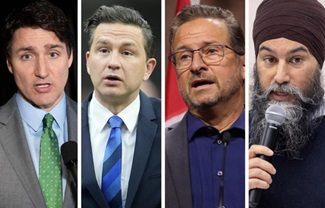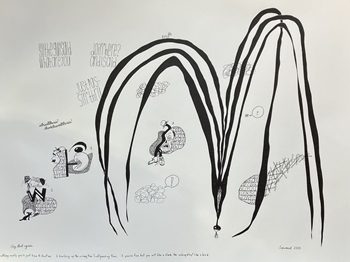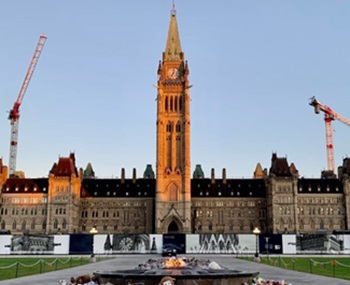The long future of Liberals and New Democrats in Canada : will Harper/Poilievre Conservatives finally get the progressive opponent they want?
Oct 6th, 2024 | By Randall White | Category: In BriefRANDALL WHITE, FERNWOOD PARK,TORONTO. SUNDAY, OCTOBER 6, 2024. It still seems hard to know just where Bloc Québécois leader Yves-François Blanchet is going with the “Bloc’s demand to increase old age security (supported by the CPC and the NDP so far).”
According to our local (Liberal) MP here it “is too expensive and poorly targeted.”
For the very first time, however, I am starting to think that M. Blanchet’s current not-quite-clear antics just may lead to a Canadian federal election sooner rather than later (and certainly not as long away as the legislated fixed date in October 2025).
As back in the early days of PM Stephen Harper, the slightly ironic (though also historic) most likely ally of a rising but not yet commanding Conservative Party of Canada could be the Bloc Québécois?
(1) A commanding majority government for Pierre Poilievre’s Conservatives …

Unless the opinion polls are almost unbelievably wrong, the almost certain result of a federal election in any at all near future would be a commanding majority government for Pierre Poilievre’s update (mmm … backdate may be better?) of the Conservative Party of Canada that Stephen Harper largely (re)invented, not all that long ago.
Fundamentally this is not because some decisive majority of the Canadian electorate has decided that the Poilievre Conservatives are what the doctor ordered for a Canada 2024 said (often inaccurately) to be suffering from assorted ailments, cumulating since the start of the long Justin Trudeau Liberal regime that took office in the autumn of 2015.
No opinion poll is showing or has shown the Conservatives with anything even within realistic striking distance of a democratic majority of the cross-Canada popular vote.
But with three main federal parties across the country — and five parties all told in the present House in Ottawa — a commanding majority of seats in parliament can be won by a party with just a (fairly large) minority of the popular vote.
(2) Will death of Liberal party in Western Canada prove a model for all of Canada?
Put another way, the problem for those of we mere voters with progressive sympathies in Canada today is that the progressive political force in Ottawa is divided among Liberals, New Democrats, Greens, and even in some sense or degree the Bloc in Quebec.
The September 29, 2024 (and October 6) update of the 338Canada polling averages, eg, had the Conservatives at 43% of the popular vote. But the Liberals, NDP, and Greens together had 44%. (And if you counted about two-thirds of the Bloc vote in Quebec as progressive, you would get an even 50% for the better angels of our democratic nature!)
One way around all this is just to say that the Liberal Party of Canada is fading across the country, and will soon enough be replaced or succeeded by the New Democrats writ large. This is what has to no small extent already happened provincially in Western Canada (especially with the somewhat surprising current NDP-Conservative contest in BC) — all the way from the Lake of the Woods to Vancouver Island on Canada’s Pacific Coast.
(And it was once thought this is what in fact happened to the Mother of Parliaments in the United Kingdom in the 20th century. But now the UK in the 21st century has five parties in parliament, just like Canada! — and, just recently, a strong [Labour] majority government with not much more than a third of the popular vote!)
(3) Could Liberals, New Democrats, and Greens in Canada ever unite in single progressive party??
A major objection to all this, I think, is that it is equally the path of Canadian political party evolution favoured by Prime Minister Stephen Harper in his heyday. And that is quite arguably because it will lead to some perpetual cycle of Conservative-New Democrat election contests, that Conservatives will most often win.
Alternatively, rather than the see the New Democrats, as it were, wipe the Liberals off the map, I’d like to see the present federal Liberal and New Democratic parties (and possibly Greens too?) unite in a single big-tent progressive political party.
Put very hastily, I think that even in Western Canada the Liberal party can bring ingredients of successful progressive public policy that the NDP by itself still has trouble moving forward. Part of this is just a greater friendliness to (somewhat) free markets, and to the business culture that is not going away in any realizable progressive nirvana.
Another part is widely shared feelings about the importance of both liberal democracy and social democracy in the 21st century democratic future — both freedom and equality. And the ultimate argument is that a new united progressive political party which fights for both these sides of the people’s cause will most often win, in any perpetual cycle of elections against Conservatives.
(4) A new beautiful friendship down the road?
We are in Canada today of course light years away from any even wild talk about Liberals and New Democrats (to say nothing of Greens) uniting in a single more potent Canadian progressive political party.
At some point down the road along which Pierre Poilievre’s Conservative Party of Canada wants to lead Canada, however (a road already started by Stephen Harper, 2006–2015), extending the Liberal-NDP Supply and Confidence Agreement, 2022–2024 may seem like just the start of at least some approximation of a new beautiful friendship — like Humphrey Bogart and Claude Rains at the end of “Casablanca.”





